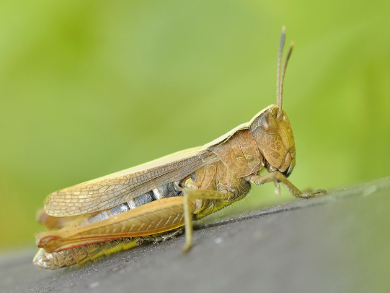Hard cuticle tissues in insects and marine organisms have little to no inorganic content. Proteins, catecholamine derivatives, and polysaccharide derivatives produce the strong mechanical properties of marine worm jaws, squid beaks, and insect shells.
Haeshin Lee, KAIST, Daejeon, South Korea, and colleagues report that dopamine (a type of catecholamine) cross-links and strengthens proteins in grasshopper mandibles. The use of dopamine rather than its derivatives distinguishes grasshopper mandible formation from typical insect cuticle formation.
Unlike the oxidation of chemically protected dopamine derivatives, dopamine oxidation is extremely sensitive to air. The researchers report that rapid dopamine oxidation could cause grasshopper mandibles to harden quickly, enabling grasshoppers to eat plant cellulose immediately after hatching.
Grasshopper mandibles contain regions of high, moderate, and sparse tanning (darkening). In the highly tanned areas, the concentration of dopamine cross-linked cuticular proteins is four times greater than in the untanned areas. The surface morphology of the mandibles showed that the dopamine-based tanning process densifies and hardens the chitin in the mandibles.
- Role of Dopamine Chemistry in the Formation of Mechanically Strong Mandibles of Grasshoppers,
Kyueui Lee, Ekavianty Prajatelistia, Dong Soo Hwang, Haeshin Lee,
Chem. Mater. 2015.
DOI: 10.1021/acs.chemmater.5b01680




